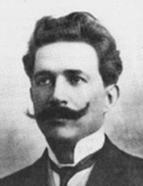

Manoel Bomfim left behind a vast body of work spanning education, psychology, pedagogy, and history, as well as numerous didactic and paradidactic publications. Among these, the book Através do Brasil [Through Brazil] (1910), co-authored with Olavo Bilac, stands out as a landmark in Brazilian school literature, achieving 66 editions. This reading book for elementary school students was perhaps inspired by the 19th-century classic Le tour de France par deux enfants . In their work, Bilac and Bomfim narrate the adventures of two brothers traversing Brazil in different directions in search of their families. The story begins along the São Francisco River, described as "the great river that is uniquely and essentially Brazilian," and introduces children to a nation of vast contrasts and continental dimensions. The book aims to provide young readers with "a general and concrete view of Brazilian life—its people, customs, landscapes, and distinctive features" ( Através do Brasil , 2000, p. 46). Its objective was both pedagogical and patriotic, aiming to instil in children a sense of national unity.
Bomfim’s continued work in pedagogy and his advocacy for popular education, combined with his strong nationalism, naturally extended into the field of history. This shift began with his influential book América Latina. Males de origem [Latin America: Evils of Origin] (1905). In this work, he sought to challenge the "(...) perversely malevolent reputation of which South America is a victim [in Europe]" ( América Latina ..., 1993, p.35). Nevertheless, the author acknowledges that "(...) the South American peoples are today in a state that barely entitles them to be considered civilised peoples" (p. 49). This admission sets the stage for the two central questions the essayist seeks to address: "(...) How, then, can this delay be explained—of new nations, certainly lively, established in favourable, fertile, and forgiving territories? (...) These are people who have all the elements to be advanced and happy, and yet they lead a painful and difficult life: why?" (p. 50). Indeed, these questions had been troubling intellectuals and politicians in the former Iberian colonies of the Americas since the 19th century. In Brazil, they gained prominence during the various adverse historical contexts the country faced, such as the crisis of the early 20th century. This period revealed the disillusionment of the literate elite with the artificiality of the newly established republican institutions. Proclaimed on 15 November 1889, the Republic had failed to resolve the country’s pressing issues, contrary to the expectations of its most fervent advocates. The economy remained predominantly agrarian, sustained by coffee exports, despite some urban-industrial growth. The majority of the population continued to live in poverty and ignorance. Electoral processes lacked legitimacy, as the central government was controlled by oligarchic groups from the states of Minas Gerais and São Paulo, which alternated in power. At the same time, following the First World War, a nationalist sentiment of diverse ideological hues began to flourish within intellectual circles. Its ultimate aim was to promote a sense of "national regeneration." For the traditionalist sectors, still rooted in the rhetoric of constitutional idealism, this entailed exalting the homeland while adopting foreign liberal models. Conversely, for progressive groups, regeneration meant rejecting these external formulas and seeking practical solutions to Brazil’s unique challenges—solutions that could only emerge through a thorough investigation of the nation’s realities. It is precisely this diagnosis that Manoel Bomfim seeks to undertake in América Latina. Males de origem . According to Bomfim, the genesis of the struggles and violence afflicting the peoples of Latin America lay in the process of conquest and exploitation to which their territories had been subjected. This premise serves as a foundation for his analysis of the domination imposed on Latin American countries by their Iberian colonisers. The doctor from Sergipe employs the notion of parasitism as a "metaphor-concept" (Sussekind, “Manoel Bomfim. A América Latina,” 2000, p. 609) to explain the causes of the atavistic backwardness and the myriad "evils" that plagued South American nations.
This work is financed by national funds through FCT - Foundation for Science and Technology, I.P, in the scope of the projects UIDB/04311/2020 and UIDP/04311/2020.
